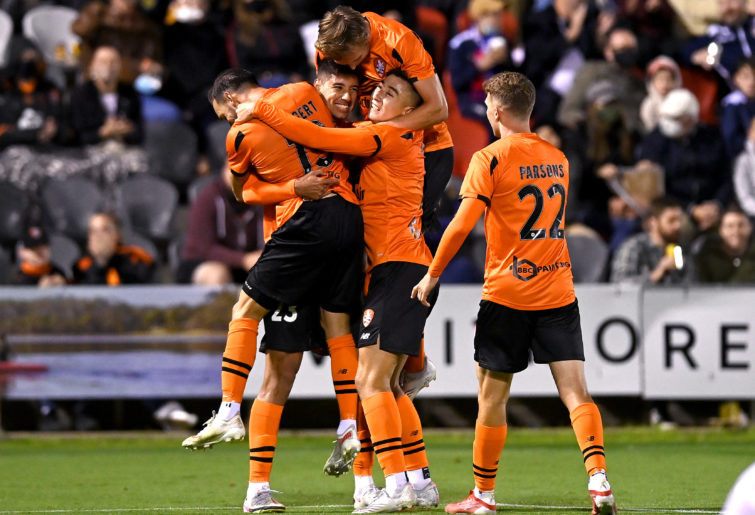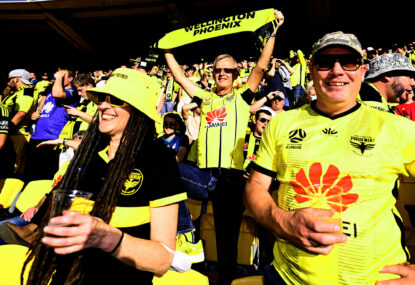
There’s a long history of distrust between Australia’s large football community and the people running the professional level of the local game. Plenty of clubs have risen and fallen. In fact, we are one of the few countries that have had to re-build their national leagues from scratch.
But when we use the word “league” what are we talking about? The organising body that arranges fixtures, manages TV contracts and referees?
Or a league as a collection of competing clubs engaged in ongoing “co-opetition”. We really use both, and switch between meanings with ease. Unfortunately, that linguistic sleight of hand can lead us to missing problems that are right under our noses.
Fans are not mugs. We see and hear things very easily in this hyper-connected world that we live in. Fans are attracted not just to on-field success, glamour and history, but are correspondingly put off by instability and changing identities.
Although the historic narrative about the NSL’s failure surrounds the question of mono-ethnic clubs, the league was also filled with clubs that regularly hurt their relationship with fans through shifting home grounds or the clubs’ very identities.
Who can forget the South Melbourne “Lakers”? Or Sydney Olympic who never found a spiritual home in Sydney across the decades?
I argue that the NSL was unstable because its constituent clubs were unstable and had difficult relationships with their potential fans. Unfortunately, we’re now living through the same difficulties with the majority of the existing top flight clubs.
If we were to run our eyes over the twelve existing A-League clubs to see which have a reputation for stability (or at least minimal periods of instability), as well as generally making good decisions around recruiting coaches and players, we really only have four candidates: Sydney FC, Melbourne Victory, Melbourne City and Adelaide United.
Only four clubs have credible reputations with their fans.

Adelaide United and Melbourne Victory offer stability. (Photo by Mark Brake/Getty Images)
Then we have the Problem Children. All of these clubs have something deeply wrong with them that harms their credibility with their existing or prospective fans.
They have chronic off-pitch issues that alienate fans. None of these clubs are reaching their potential.
Macarthur FC have actively alienated their relationships with fans in the region through high ticket prices and a fractious relationship with their own active fans.
They have shown minimal interest in developing a large, thriving fan-base. This is what happens when you sell a licence to real estate developers with no prior experience in football.
Western United have very similar structural problems to Macarthur, with the aggravated offence of not delivering on any of their promises to develop a training ground and home stadium in Western Melbourne. Arguably they bought their way into the league under false pretenses.
The owner of Perth Glory, Tony Sage does some things well, but undermines his occasional good works by undermining public confidence in the Glory. Semi-regularly talking about moving the club away from its spiritual home to other less impressive stadiums in Perth damages the club’s image of stability.
As does floating ridiculous thought bubbles about an impossible to implement league with South East Asian clubs.
Western Sydney Wanderers’ board has a high tolerance for incompetence that has allowed several consecutive seasons of mediocrity.
Fans have well and truly had enough and stayed away in droves. Some competent off-field and on-field leadership can bring the success that will bring back the red and black bandwagon.
Newcastle Jets have no money, and are owned by a consortium of other A-League club owners who are keeping the Jets on life support. This is nice, but there’s a distinct lack of local leadership and investment to get the Jets back up in public consciousness in the Hunter.
They are just hanging on.
CCM have an owner who is keeping the club at its lowest viability with minimal investment. They have the odd good season and a knack for giving valuable opportunities for good young talent, but the club is just not built for sustained on-field success.
Brisbane Roar also have ownership problems, compounded by bad decision-making in moving the club to a small outer suburban home instead of its central home at Lang Park.

(Photo by Bradley Kanaris/Getty Images)
Remember, a rolling stone gathers no moss, and a club that moves its home grounds gathers no consistent fan-base. Don’t be like Sydney Olympic. Cheap-skate decisions like that also harm the public confidence in the club’s future.
Wellington Phoenix have a good relationship with their fans, and probably shouldn’t be on the naughty list. Being exiled to Australia and thousands away from their fans for the last two seasons is in no way shape or form their own fault.
However, they have been a lame duck, and that needs to be acknowledged when assessing where the A-League is at right now.
Every league is the sum of its parts. So we have a serious problem where only one third of our clubs can be considered to have adequate credibility with their fans.
Does that mean we are really operating at one third capacity? It’s probably worse than that because the inadequacies of the majority of clubs are dragging down the overall image of the game, and harming the competent clubs as well.
So what’s to be done? Unfortunately, this is where governance and politics kick in. Dry subjects to some, but critical to understand if we are to embrace success.
In better leagues, the competent clubs heavily outnumber the incompetent clubs. And they also have mechanisms for enforcing standards such as promotion and relegation. In franchise leagues, the League headquarters also tend to have step-in powers.
For example, the NBA forced the sale of the LA Clippers when its owner brought the league into disrepute with some off-court issues.
When the FFA ran the A-Leagues they had too high a tolerance for badly run clubs. They only ever stepped in when the very existence of a club was in doubt.
Any harm to the overall reputation of the league, and the sport more generally, was ignored. We can’t live like that anymore. We must enforce off-field competence standards in order to rebuild the credibility of the game.
So the question for us can the APL enforce standards on the recalcitrant clubs? It’s not just a question of legal power, but also of politics. Wellington aside, if we have 7 of 12 clubs deserving to be penalised for bringing the league’s reputation down, they’re not going to vote against themselves. Turkeys don’t vote for Christmas after all.

Wellington Phoenix fans (Photo by Joe Allison/Getty Images)
Perhaps Silver Lake owning 1/3rd of the league will actually be a saving grace. As an investor with its eye only on return on investment they will hate the idea of a cabal of incompetent clubs continuing to drag down the league’s reputation. Maybe ViacomCBS will use its 2% voting rights to weigh in as well?
At the time of the unbundling of the APL from Football Australia, FA advised it will also “retain ‘good of the Australian game’ rights in respect of the Professional Leagues, which apply to a variety of matters that are aimed at ensuring the ongoing growth of the Professional Leagues”.
We don’t publicly know what that means in detail, but perhaps Football Australia has some residual power here too?
But one thing is for sure. The APL needs to start exerting power against the recalcitrant clubs that are holding the game back. It will be very interesting to see how this off-field political dynamic plays out as the league begins its recovery from COVID.

Leave a Reply